Women Athletes Even Out the Playing Fields
By Gayle Fee
Photography by Hubert Schriebl
When it comes to sports, women are playing to win. Sure, it took until 1967 for the Boston Marathon to realize women were capable of running 26.2 miles. And the Augusta National Golf Club, home of the Master’s Tournament and the sport’s most hallowed grounds, didn’t admit women members until 2012 and just held its first women’s tournament in April. But thanks to 1972’s Title IX, which guaranteed women’s equality on school and college playing fields, and the brave female sports pioneers, more women everywhere are out there getting their sweat on. And that includes Stratton Mountain and the surrounding area, where scores of female athletes are skiing, riding, hiking, biking, hitting the golf courses and tennis courts, and much, much more. And no matter what the sport, these women are winning—staying active, getting healthier, and keeping mentally sharp and physically strong.
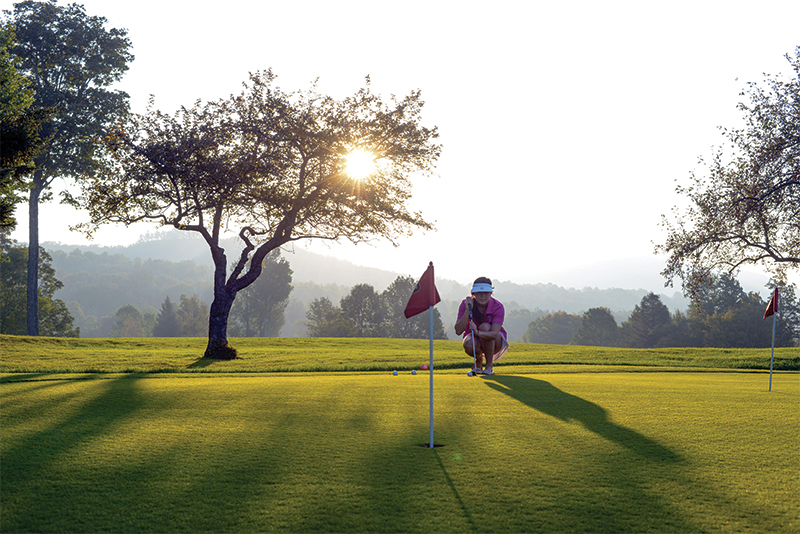
“Sports was not something I did growing up,” said Manchester resident Lillian Short. “My high school had no girls’ sports. There was basketball and football for boys, but the girls were cheerleaders and majorettes.” As a result, Short and many of her female classmates were frustrated jocks.

“My family used to go to the Jersey Shore in the summer,” she continued. “There were tennis courts down by the water and my brother and I used to walk down there and watch people playing. I thought it was fascinating. I went to a little store downtown and bought two wooden tennis rackets for $2 each. We’d wait until people would leave balls on the court and use those. This was around the time of Billie Jean King and the Battle of the Sexes, and because that was happening, it became easier for a girl to do it.”
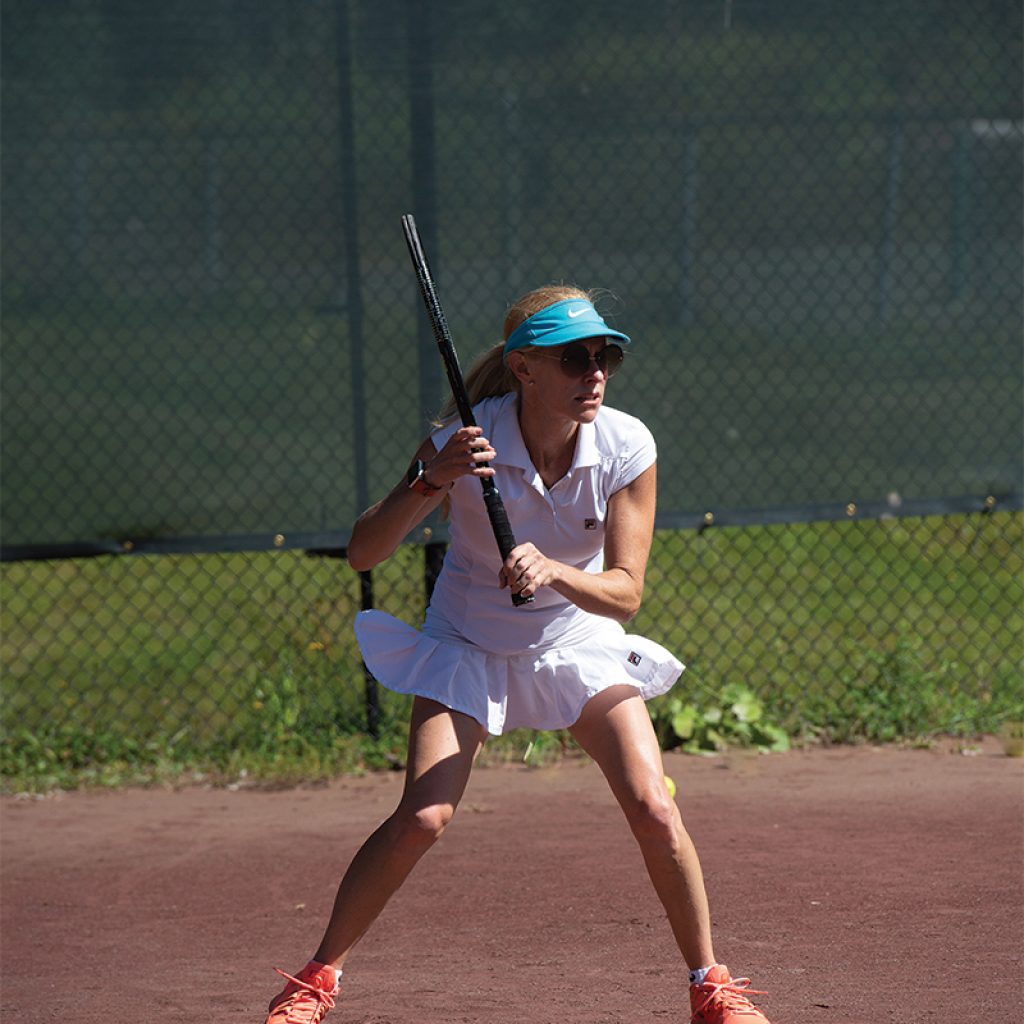
In her 20s, Short met her husband, an avid skier and tennis player “with a lot of patience,” she said. With his coaching, her jock dreams finally became a reality. Today she still takes “tons and tons” of tennis lessons, regularly plays doubles at the Manchester Country Club where she heads up the tennis program, does yoga and Pilates, and skis all winter.
“Equality in sports is how it should be,” said tennis pro Frank Bonte. “Maybe it wasn’t like that in the old days, but everybody should do whatever they want regardless of whether they are a man or a woman.” Bonte, who is the tennis professional at both the Manchester Country Club and Ekwanok Country Club, said currently he has more women players than men. “I think the women around here are very eager to learn and to get better at what they do,” he said.
At Stratton Mountain, where there are 16 courts that are open to the public, tennis pro Rob Menzies will again offer the popular Tennis 101 program this season. The free, four-week course teaches the fundamentals of the game, and Menzies expects that, as usual, most of his students will be women. “The ladies seem to be more open to coming out and trying to learn,” he said.
Sian Morse played tennis in high school but it wasn’t until her son took up the sport that she got back out on the court. “Three or four years ago he was taking group lessons with some other kids at Stratton,” she said. “I think Rob got sick of the moms sitting around chatting so he talked us into doing a group lesson. It was fabulous and I was off to the races.”
Morse now plays three or four times a week and is in it to win it. “I am a competitive person,” she said. “It feels good to win. I know it’s not Wimbledon, but when you hit a shot back and get the points, it feels fantastic.”
Dori Henry, who played on Stratton’s U.S. Tennis Association team, also loves the competition but said the best thing about the sport is that it keeps her active and busy year-round. Henry plays on Stratton’s two indoor courts all winter but looks forward to the warmer months when the 14 outdoor courts open. “It’s heaven to play here in the summer,” she said. “It’s so nice to be outdoors when the humidity’s low and you look up and see the mountain. That’s why we love Vermont.”
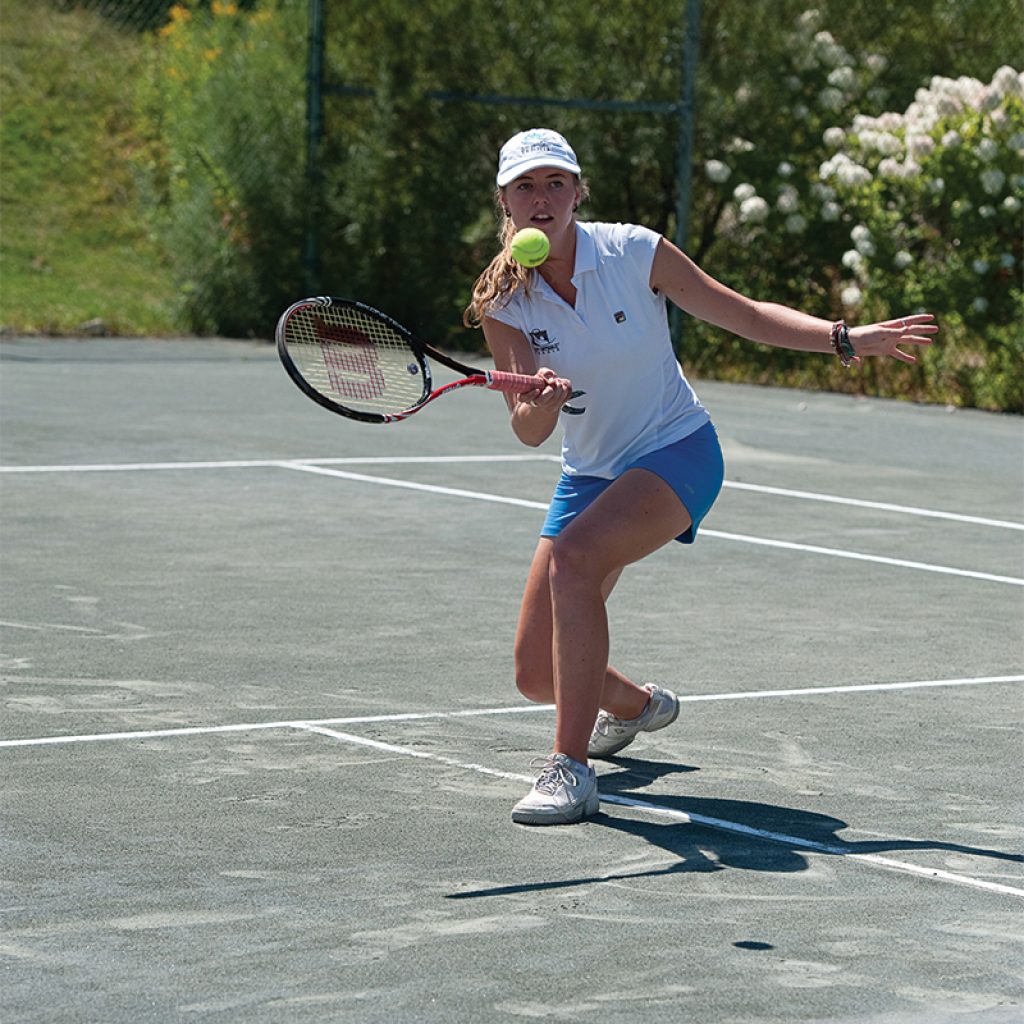
Stratton’s Cliff Drysdale Tennis School is a great place to learn the game or to tune up your stroke. It offers three daily clinics that include some instruction, some match play, and some cardio work. “It’s open to everyone,” Menzies said. “Some people come in who played a lot of tennis in college. Others come not knowing a thing. But tennis is a great thing for your health and will help you stay active much longer. And once you learn, tennis can be a sport for life.”
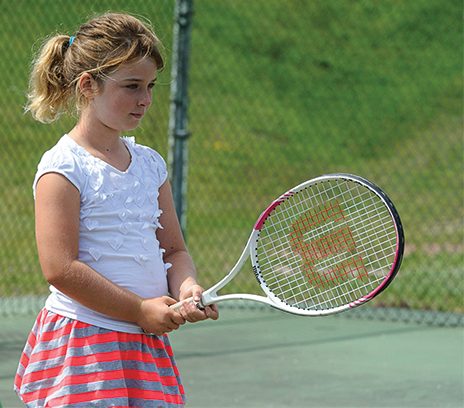
Jackie Dill is iconic and known to all. She skis in the winter and plays tennis four or five times a week in the summer. She said sports is one way she has made friends and kept physically, mentally, and socially sharp for decades. “You have to make your life interesting,” she said. “You have to go out and meet people. Being alone and depressed is not the life we want. You need to be active and socially involved. No one is going to knock on your door and ask you if you are lonely.”
Dill, who has been playing tennis since she came to Vermont from Switzerland in her 20s, said hitting the court is not only a great way to make friends, it’s a great workout that always gets her competitive juices flowing. “Playing a game of tennis lets you get a lot of exercise in a very short time,” she said. “I also like to challenge myself, to try to do something and prove to myself that I can still do it. And I like the competition. I like to go out and try to do my best to win. I don’t mind losing, that’s the game, but I try my best.”
Manchester real estate broker Annie Bessette took up tennis as a girl, hitting balls against her parents’ garage door in Buffalo, New York. She continues to play regularly at both Stratton and the Manchester Country Club because, she said, “tennis makes me very happy.”
“I just get such joy out of trying to hit that yellow ball,” she continued. “And tennis is strategic, it forces you to be physically fit, it takes a good amount of focus and concentration, and when it all does flow, it’s such a good feeling.”
It’s a well-known fact that physical activity releases endorphins that trigger a positive feeling that was first dubbed a “runner’s high.” But local women who play golf, tennis, and other sports say there are other advantages as well. “Nothing is more luxurious than spending 4½ hours in a beautiful environment, enjoying nature, and playing 18 holes of golf,” said Manchester summer resident Karen Ganz. “I love the beauty of a golf course and the camaraderie is just the best. I actually prefer to play with women; they tend to be more patient with their mistakes. That’s not to say that I don’t play with very competitive women, but their expectations are more realistic.”
Christine Koeppe, who works at the pro shop at the Stratton Mountain Golf Course and plays in the women’s league there, said golfing with other women takes the game to a new level. “Instead of going out and just hitting balls by yourself, you can encourage other people, and hopefully they encourage you, and you tend to play better,” she said. Koeppe added that she’s developed some deep, long-lasting friendships with other women thanks to their shared love of golf. “We maybe come from different backgrounds and do different things but we all have golf in common,” she said. “That’s the common thread that binds us together.”
Stratton Mountain Golf’s 27-hole championship course is a great place to work on your handicap. It’s open to the public and each of the three nine-hole courses has something to suit every level of player, from beginners to scratch golfers. “They’re all very different,” Koeppe said. “The Forest Course is very much target golf. It’s narrow and you really have to focus. You don’t want to get into trouble on that course. The Mountain Course, I love it and it’s one that I walk all the time. It’s a little more wide open with beautiful views of the mountain. It’s a more relaxing course and I feel like there’s more room for error.
“The Lakes Course is equally as beautiful,” she continued. “It’s kind of a mix between the Forest and Mountain courses. You have a couple of really difficult holes and a couple of really fun par 3s. I like all three courses. I don’t think I could pick a favorite. I think it depends on what kind of golf mood you’re in.”
Once considered a “gentlemen’s game,” the sport has recognized that women and girls are, in many ways, the future of golf. Currently, the PGA and LPGA are actively trying to lure more women out onto the course and recently launched the #inviteHER campaign aimed at drawing more women into the sport. “Women want to be invited to the game, and it’s our duty to give them that opportunity,” Jane Geddes, executive director of the LPGA Amateur Golf Association, told Golf Digest. “We are committed to promoting an environment that makes all females feel more comfortable on the course so they develop into lifetime golfers.”
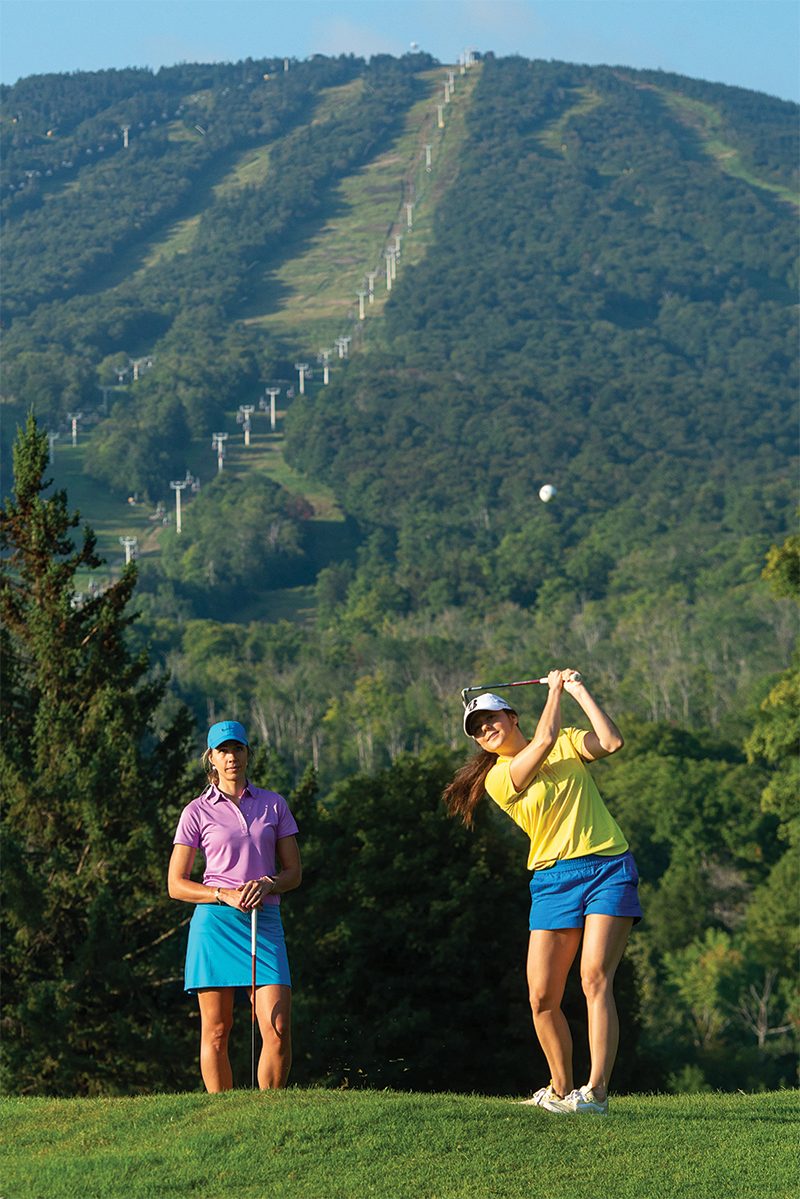
At Stratton, golf services manager Mike Bailey is embracing that strategy. “One of the things we are doing for women this season is to give them a place to play where they are not pushed by men’s groups,” he said. “We’re taking blocks of time on one 9-hole course and the only people out there will be women.” The women-only tee times will be available on Mondays, he said, with a similar block carved out for children on Wednesdays.
Over at the Manchester Country Club, new head pro Kim O’Neil also is focused on growing the women’s and junior’s golf programs. As a result, there will be a new set of forward tees this season in addition to the existing family tees that will make the course a little easier for women and younger players.
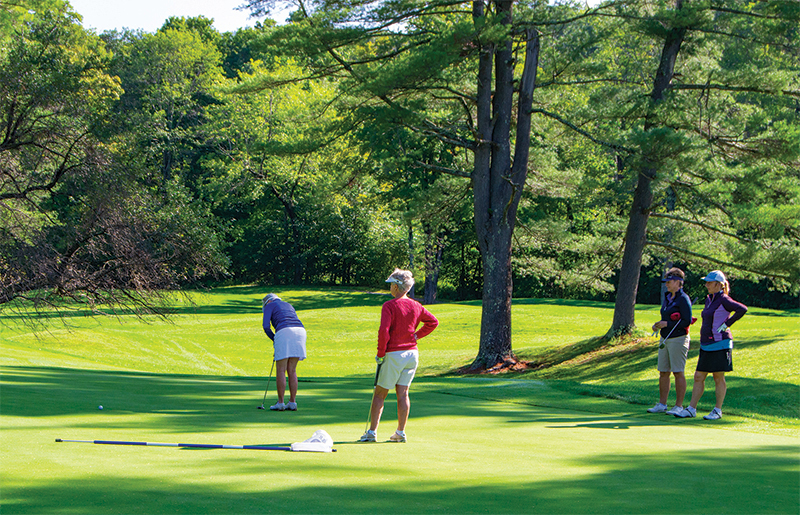
“The tee that the ladies had been playing from was 5,130 yards and that length and the course elevation made it really challenging, especially for some of the older women who maybe can’t hit that long drive anymore,” said golf committee co-chairperson Lucie Barnard. “I think the new red tees will make it a lot more fun for them and we’re really excited about it.”
At The Equinox, they are celebrating the resort’s 250th year and Women’s Golf Month in June with special rates and clinics for women golfers at the resort’s award-winning, par-71 course. “In 1927, Louise Orvis hired golf course architect Walter Travis to design The Equinox Golf Club, as women were not allowed to play on the neighboring golf course,” said head golf pro Joan McDonald.
“In honor of this, The Equinox will be hosting a complimentary clinic every Tuesday in June for women of all abilities.”
In addition to the obvious benefits, enjoying the outdoors and getting some all-important exercise, learning the basics of golf can be a good career move for women. Pam Kraft, a golf pro at Stratton for more than 14 years who now works at the Taconic Golf Club in Williamstown, Massachusetts, pointed out that a lot of business is done on the golf course. “I worked on Wall Street from 1986 to 2001,” she said. “Not a lot of women played golf, it was pretty much a man’s business. But the firm would hold events and scrambles on the golf course and they needed women to play. So, if you could play you had a leg up.
“And then there are the social aspects of the sport. Jan Horowitz, who started playing with lessons at Stratton when she was in her 40s, still hits the links at 71 and a big reason is because she’s made so many friends on the course. “At the Manchester Country Club, I know everyone, which is nice,” she said. “Even if I don’t want to play, I will go over to the club and have lunch and when I walk onto the patio, it’s ‘Hi Jan. Hi Jan. Hi Jan.’ My daughter asked me, ‘Do you know everyone here?’ And you know, I think I do.”
For women, that kind of connection is often the best part of getting involved in sports. Lisa Kelly, a mother of three teens and the owner of the Zen Revolution fitness studio in Manchester, developed a “wolf pack” of women pals after she launched a Facebook page that gets local gals together for hikes, kayaking, rock climbing, skiing, and snowshoeing.
“We understand each other really well and we all help each other in terms of life,” she said. “I’ve learned so much from these women about how to just walk through things like raising teenagers. There’s nothing like the bond between a group of women.”
Devon Cohen, assistant director of the Stratton Mountain Sports School, hikes the mountain with a group of women pals for similar reasons, partly for the workout and partly for the chance to hang out with friends and talk about life. “It’s very much like group therapy and there’s usually enough time on a hike to the summit to get into the real nitty-gritty if you need to,” she said. “Boy, if that mountain could talk. It knows everybody’s secrets!”
In addition to the camaraderie, hiking is a great way to soak up the natural beauty that surrounds the Stratton area and the peaceful, easy feeling that comes along with that. “For me, hiking feels like a connection with nature that you really don’t get anywhere else,” Kelly said. “It gives me the ability to empty my mind and really stay present. You let go of your worries and that list in your head and are more concerned with the next step on the path. I look at the trees, the woods, and it captivates me. I find a real sense of serenity.”
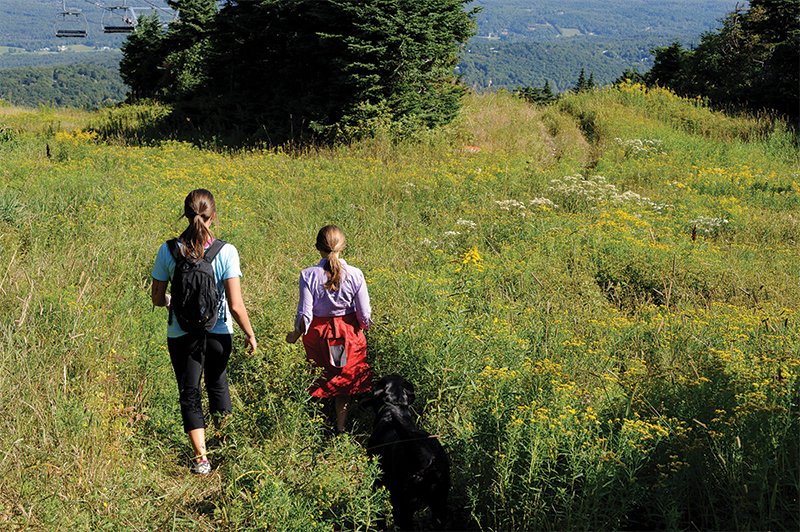
Not to mention that an hour of hiking will burn as many as 500 calories. It will also improve blood pressure, boost bone density, build strength in your glutes, quadriceps, hamstrings, hips, and lower legs, and it will strengthen your core. “We know it’s healthier both physically and emotionally to be active,” Kelly said. “It’s the best way to ensure you’ll live a long life.”
Anne Houser, who with her husband Ron, owns The Mountain Goat outdoor sports store in Manchester, said one of the main reasons hiking is such a popular sport in the area is the storied Long and Appalachian trails that share a route over Stratton Mountain. “It’s rare to find a loop on the Appalachian or Long trails but there’s one here,” she said. “You can hike up the backside of Stratton to the summit, and that’s a wild and woodsy trail that is very different from the front of the mountain. There’s a fire tower at the summit with great views. From there, it’s 3½ miles to Stratton Pond, which is a beautiful setting, and then it’s a little more than four miles back out. It’s a great 10½-mile hike that’s both challenging and, if you do it over two days and camp in between, it’s also great for families.”
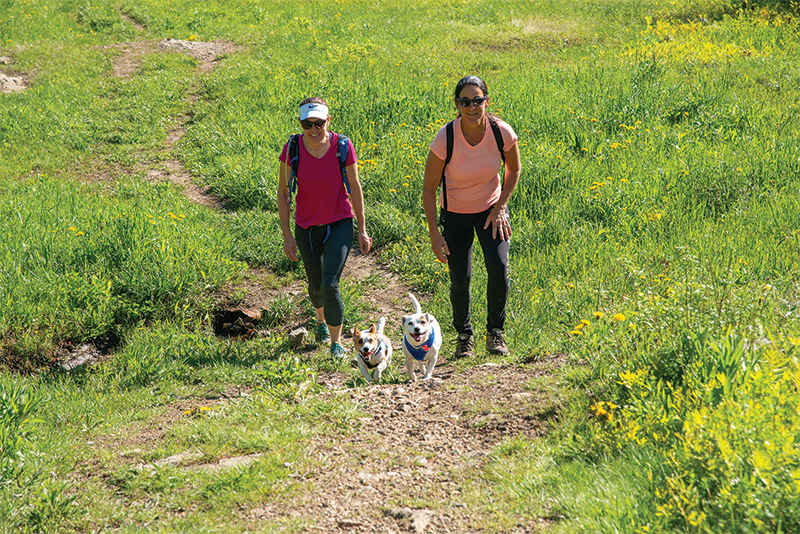
Houser recommends visiting a local outfitter such as The Mountain Goat to pick up maps and information about the local trails before heading out. “We can give advice about what would be a good hiking route depending upon conditions,” she said. “We also have a little list of things we give out to anyone who asks about what to bring on a hike. Obviously, water, extra clothing, as well as other things you might not think about like energy bars and sunblock. It’s not about selling stuff; we just want to make sure people go out and have fun.”
Devon Cohen said hiking is one of the simplest sports for women to get into and one of the most rewarding. “Start small,” she said. “Don’t feel like you have to go all the way to the summit right off the bat. At a quarter or half way up the mountain, the views are still incredible and still so worth the trip.” And, she added, it’s a great way for busy women to clear their heads and have some “mommy time.”
“It’s healthier than wine time, although occasionally there is a can of wine at the summit,” she laughed. “It’s all part of the experience!”
More than ever, women are making their own experiences on the playing fields that were once dominated by men. Ever since Kathrine Switzer proved women could run the Boston Marathon and Billie Jean King schooled Bobby Riggs on the tennis court, women have embraced the joy that comes from all manner of athletics, getting stronger, more flexible, mentally sharper, and physically fitter. And the bond that comes with playing alongside other women often turns into lifelong friendships. Billie Jean King said that sports “teaches you character, it teaches you to play by the rules, it teaches you to know what it feels like to win and lose. It teaches you about life.” And those are lessons everyone—regardless of their sex—needs to learn.

